河北省2020学年高二英语上学期开学考试试题
- 格式:doc
- 大小:148.70 KB
- 文档页数:16
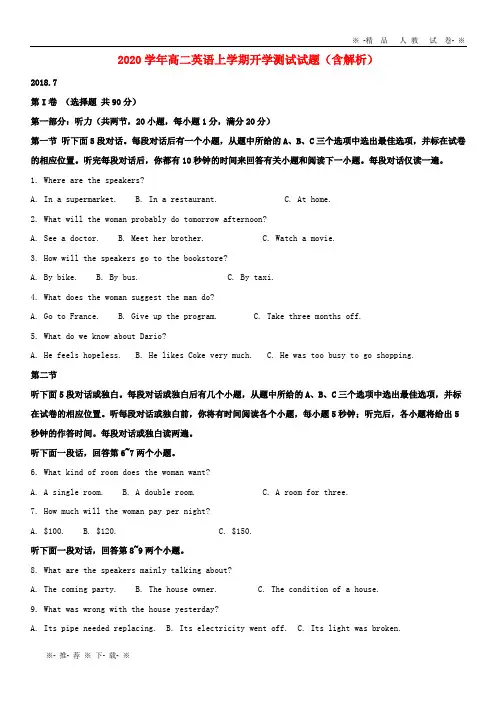
2020学年高二英语上学期开学测试试题(含解析)2018.7第I卷(选择题共90分)第一部分:听力(共两节,20小题,每小题1分,满分20分)第一节听下面5段对话。
每段对话后有一个小题,从题中所给的A、B、C三个选项中选出最佳选项,并标在试卷的相应位置。
听完每段对话后,你都有10秒钟的时间来回答有关小题和阅读下一小题。
每段对话仅读一遍。
1. Where are the speakers?A. In a supermarket.B. In a restaurant.C. At home.2. What will the woman probably do tomorrow afternoon?A. See a doctor.B. Meet her brother.C. Watch a movie.3. How will the speakers go to the bookstore?A. By bike.B. By bus.C. By taxi.4. What does the woman suggest the man do?A. Go to France.B. Give up the program.C. Take three months off.5. What do we know about Dario?A. He feels hopeless.B. He likes Coke very much.C. He was too busy to go shopping.第二节听下面5段对话或独白。
每段对话或独白后有几个小题,从题中所给的A、B、C三个选项中选出最佳选项,并标在试卷的相应位置。
听每段对话或独白前,你将有时间阅读各个小题,每小题5秒钟;听完后,各小题将给出5秒钟的作答时间。
每段对话或独白读两遍。
听下面一段话,回答第6~7两个小题。
6. What kind of room does the woman want?A. A single room.B. A double room.C. A room for three.7. How much will the woman pay per night?A. $100.B. $120.C. $150.听下面一段对话,回答第8~9两个小题。

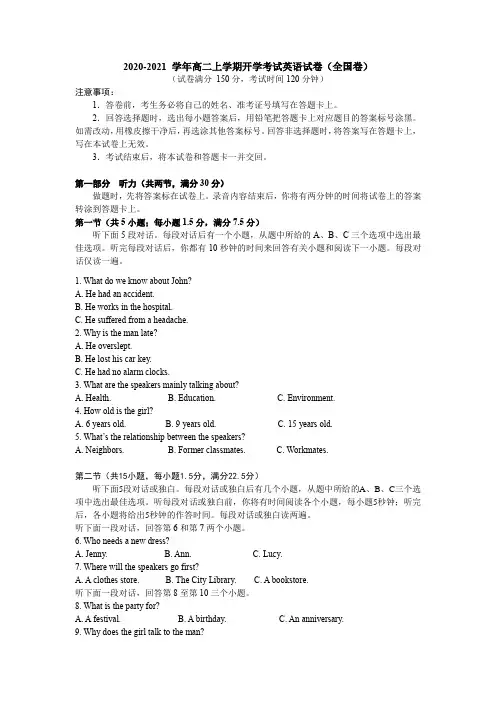
2020-2021 学年高二上学期开学考试英语试卷(全国卷)(试卷满分150分,考试时间120分钟)注意事项:1.答卷前,考生务必将自己的姓名、准考证号填写在答题卡上。
2.回答选择题时,选出每小题答案后,用铅笔把答题卡上对应题目的答案标号涂黑。
如需改动,用橡皮擦干净后,再选涂其他答案标号。
回答非选择题时,将答案写在答题卡上,写在本试卷上无效。
3.考试结束后,将本试卷和答题卡一并交回。
第一部分听力(共两节,满分30分)做题时,先将答案标在试卷上。
录音内容结束后,你将有两分钟的时间将试卷上的答案转涂到答题卡上。
第一节(共5小题;每小题1.5分,满分7.5分)听下面5段对话。
每段对话后有一个小题,从题中所给的A、B、C三个选项中选出最佳选项。
听完每段对话后,你都有10秒钟的时间来回答有关小题和阅读下一小题。
每段对话仅读一遍。
1. What do we know about John?A. He had an accident.B. He works in the hospital.C. He suffered from a headache.2. Why is the man late?A. He overslept.B. He lost his car key.C. He had no alarm clocks.3. What are the speakers mainly talking about?A. Health.B. Education.C. Environment.4. How old is the girl?A. 6 years old.B. 9 years old.C. 15 years old.5. What’s the relationship between the speakers?A. Neighbors.B. Former classmates.C. Workmates.第二节(共15小题,每小题1.5分,满分22.5分)听下面5段对话或独白。
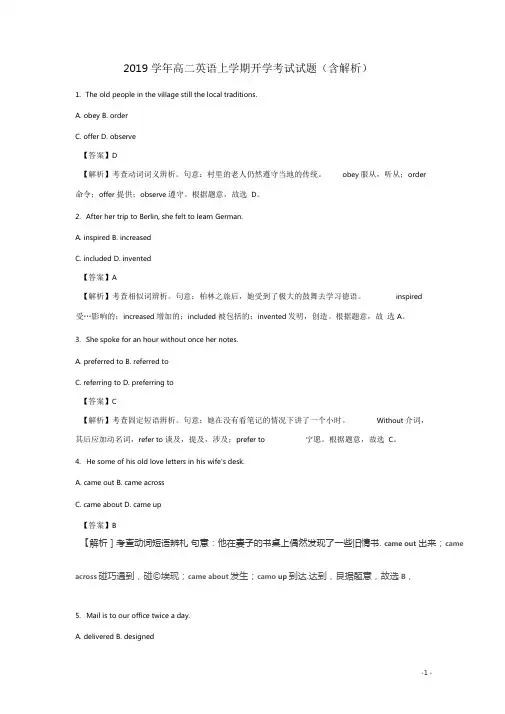
2019学年高二英语上学期开学考试试题(含解析)1.The old people in the village still the local traditions.A. obeyB. orderC. offerD. observe【答案】D【解析】考查动词词义辨析。
句意:村里的老人仍然遵守当地的传统。
obey服从,听从;order命令;offer 提供;observe遵守。
根据题意,故选D。
2.After her trip to Berlin, she felt to learn German.A. inspiredB. increasedC. includedD. invented【答案】A【解析】考查相似词辨析。
句意:柏林之旅后,她受到了极大的鼓舞去学习德语。
inspired受…影响的;increased增加的;included 被包括的;invented发明,创造。
根据题意,故选A。
3.She spoke for an hour without once her notes.A. preferred toB. referred toC. referring toD. preferring to【答案】C【解析】考查固定短语辨析。
句意:她在没有看笔记的情况下讲了一个小时。
Without介词,其后应加动名词,refer to 谈及,提及,涉及;prefer to 宁愿。
根据题意,故选C。
4.He some of his old love letters in his wife's desk.A. came outB. came acrossC. came aboutD. came up【答案】B【解析]考查动词短语辨札句意:他在妻子的书桌上偶然发现了一些旧情书. came out 出来;came across碰巧遇到,碰©埃现;came about发生;camo up到达.达到,艮据题意,故选B,5.Mail is to our office twice a day.A. deliveredB. designedC. devotedD. declared【答案】A【解析】考查动词词义辨析。
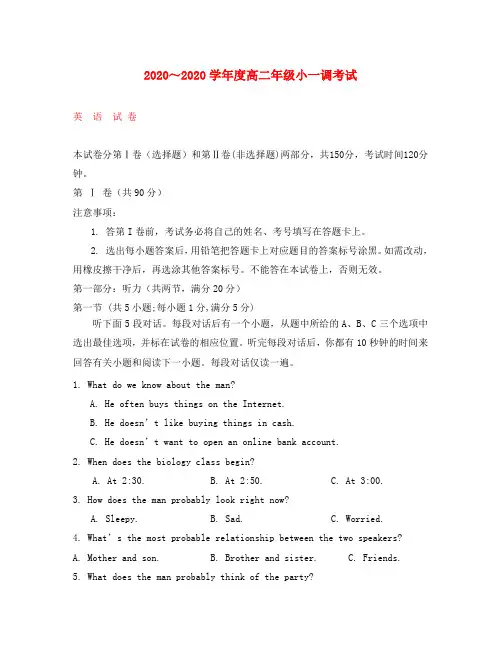
2020~2020学年度高二年级小一调考试英语试卷本试卷分第Ⅰ卷(选择题)和第Ⅱ卷(非选择题)两部分,共150分,考试时间120分钟。
第Ⅰ 卷(共90分)注意事项:1. 答第I卷前,考试务必将自己的姓名、考号填写在答题卡上。
2. 选出每小题答案后,用铅笔把答题卡上对应题目的答案标号涂黑。
如需改动,用橡皮擦干净后,再选涂其他答案标号。
不能答在本试卷上,否则无效。
第一部分:听力(共两节,满分20分)第一节 (共5小题;每小题1分,满分5分)听下面5段对话。
每段对话后有一个小题,从题中所给的A、B、C三个选项中选出最佳选项,并标在试卷的相应位置。
听完每段对话后,你都有10秒钟的时间来回答有关小题和阅读下一小题。
每段对话仅读一遍。
1. What do we know about the man?A. He often buys things on the Internet.B. He doesn’t like buying things in cash.C. He doesn’t want to open an online bank account.2. When does the biology class begin?A. At 2:30.B. At 2:50.C. At 3:00.3. How does the man probably look right now?A. Sleepy.B. Sad.C. Worried.4. What’s the most probable relationship between the two speakers?A. Mother and son.B. Brother and sister.C. Friends.5. What does the man probably think of the party?A. It’s interesting.B. It’s short.C. It’s dull. 第二节 (共15小题;每小题1分,满分15分)听下面5段对话或独白。
![2020-2021学年高二英语上学期开学考试试题 (III)[1]](https://uimg.taocdn.com/d5d95304195f312b3069a59d.webp)
2020-2021学年高二英语上学期开学考试试题 (III)第一部分:听力(共两节,满分30分)第一节(共5小题;每小题1.5分,满分7.5分)请听下面5段对话,选出最佳选项。
1. What are the speakers talking about?A. A photo.B. A camera.C. A drawing.2. What is the woman probably doing?A. Buying fruits.B. Cleaning her house.C. Looking for a shop.3. What does the man plan to do during the summer holiday?A. Save some money.B. Finish his work.C. Go on a trip.4. What sport does the man like best?A. Swimming. B Skating. C Tennis.5. Why can’t the woman go t o the party?A. She is sick.B. She is tired.C. She is busy.第二节(共15小题;每小题1.5分,满分22.5分)请听下面5段对话或独白,选出最佳选项。
请听第6段材料,回答第6、7题。
6. Who are in the photo?A. The woman’s friends.B. The woman's colleagues.C. The woman's family.7. What does John do?A. A teacher.B. A doctor.C. A student.请听第7段材料,回答第8、9题。
8. What does the woman think of her last job?A. Boring.B. Low-paid.C. Difficult.9. What does the woman like best about her new job?A. Money. B Training. C Travel time.请听第8段材料,回答第10至12题。
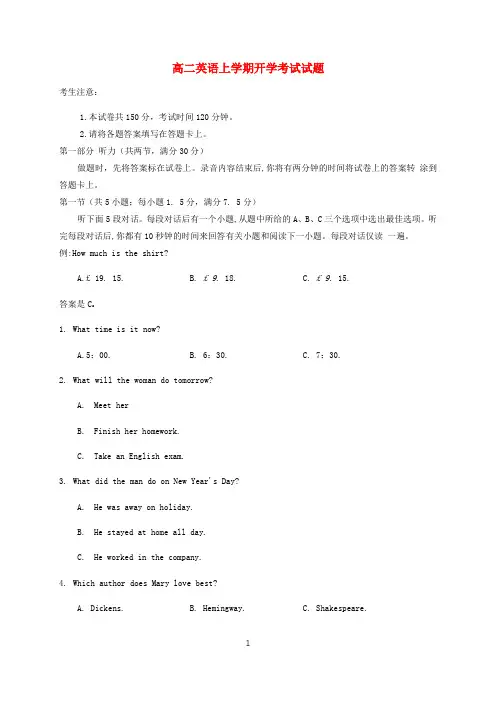
高二英语上学期开学考试试题考生注意:1.本试卷共150分,考试时间120分钟。
2.请将各题答案填写在答题卡上。
第一部分听力(共两节,满分30分)做题时,先将答案标在试卷上。
录音内容结束后,你将有两分钟的时间将试卷上的答案转涂到答题卡上。
第一节(共5小题;每小题1. 5分,满分7. 5分)听下面5段对话。
每段对话后有一个小题,从题中所给的A、B、C三个选项中选出最佳选项。
听完每段对话后,你都有10秒钟的时间来回答有关小题和阅读下一小题。
每段对话仅读一遍。
例:How much is the shirt?A.£ 19. 15.B. £ 9. 18.C. £ 9. 15.答案是C o1. What time is it now?A.5:00.B. 6:30.C. 7:30.2. What will the woman do tomorrow?A. Meet herB. Finish her homework.C. Take an English exam.3. What did the man do on New Year's Day?A. He was away on holiday.B. He stayed at home all day.C. He worked in the company.4. Which author does Mary love best?A. Dickens.B. Hemingway.C. Shakespeare.5. How long will the trip take?A. A week.B. Six days.C. Ten days.第二节(共15小题;每小题1. 5分,满分22. 5分)听下面5段对话或独白。
每段对话或独白后有几个小题,从题中所给的A、B、C三个选项中选出最佳选项。
听每段对话或独白前,你将有时间阅读各个小题,每小题5秒钟;听完后,各小题将给出5秒钟的作答时间。
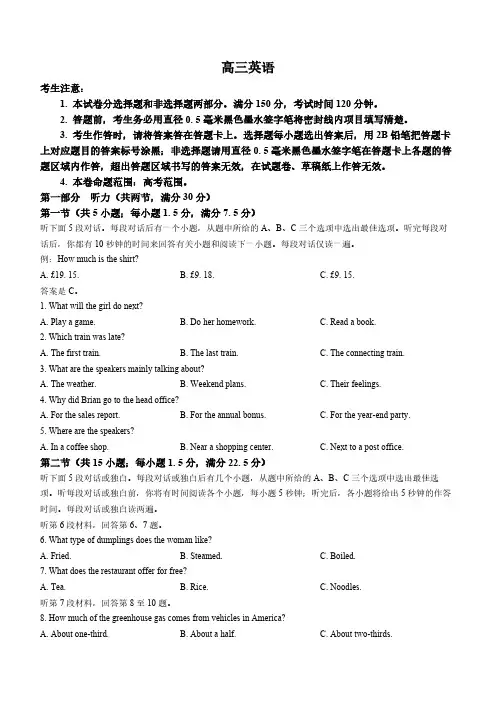
高三英语考生注意:1. 本试卷分选择题和非选择题两部分。
满分150分,考试时间120分钟。
2. 答题前,考生务必用直径0. 5毫米黑色墨水签字笔将密封线内项目填写清楚。
3. 考生作答时,请将答案答在答题卡上。
选择题每小题选出答案后,用2B铅笔把答题卡上对应题目的答案标号涂黑;非选择题请用直径0. 5毫米黑色墨水签字笔在答题卡上各题的答题区域内作答,超出答题区域书写的答案无效,在试题卷、草稿纸上作答无效。
4. 本卷命题范围:高考范围。
第一部分听力(共两节,满分30分)第一节(共5小题;每小题1. 5分,满分7. 5分)听下面5段对话。
每段对话后有一个小题,从题中所给的A、B、C三个选项中选出最佳选项。
听完每段对话后,你都有10秒钟的时间来回答有关小题和阅读下一小题。
每段对话仅读一遍。
例:How much is the shirt?A. £19. 15.B. £9. 18.C. £9. 15.答案是C。
1. What will the girl do next?A. Play a game.B. Do her homework.C. Read a book.2. Which train was late?A. The first train.B. The last train.C. The connecting train.3. What are the speakers mainly talking about?A. The weather.B. Weekend plans.C. Their feelings.4. Why did Brian go to the head office?A. For the sales report.B. For the annual bonus.C. For the year-end party.5. Where are the speakers?A. In a coffee shop.B. Near a shopping center.C. Next to a post office.第二节(共15小题;每小题1. 5分,满分22. 5分)听下面5段对话或独白。
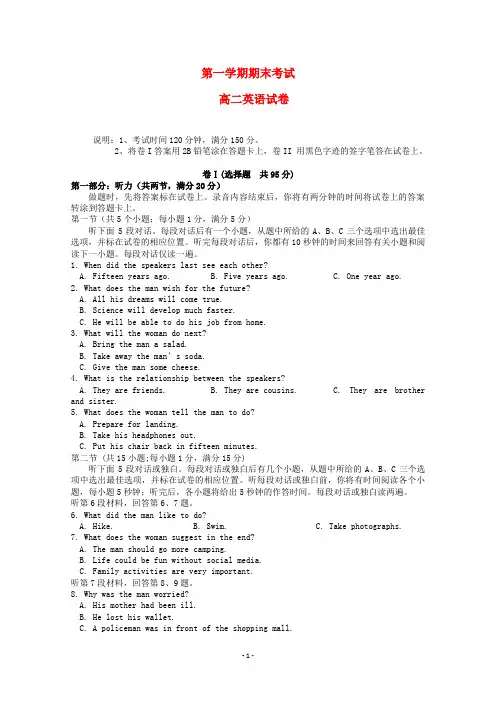
第一学期期末考试高二英语试卷说明:1、考试时间120分钟,满分150分。
2、将卷I答案用2B铅笔涂在答题卡上,卷II 用黑色字迹的签字笔答在试卷上。
卷Ⅰ(选择题共95分)第一部分:听力(共两节,满分20分)做题时,先将答案标在试卷上。
录音内容结束后,你将有两分钟的时间将试卷上的答案转涂到答题卡上。
第一节(共5个小题;每小题1分,满分5分)听下面5段对话。
每段对话后有一个小题,从题中所给的A、B、C三个选项中选出最佳选项,并标在试卷的相应位置。
听完每段对话后,你都有10秒钟的时间来回答有关小题和阅读下一小题。
每段对话仅读一遍。
1. When did the speakers last see each other?A. Fifteen years ago.B. Five years ago.C. One year ago.2. What does the man wish for the future?A. All his dreams will come true.B. Science will develop much faster.C. He will be able to do his job from home.3. What will the woman do next?A. Bring the man a salad.B. Take away the man’s soda.C. Give the man some cheese.4. What is the relationship between the speakers?A. They are friends.B. They are cousins.C. They are brother and sister.5. What does the woman tell the man to do?A. Prepare for landing.B. Take his headphones out.C. Put his chair back in fifteen minutes.第二节 (共15小题;每小题1分,满分15分)听下面5段对话或独白。
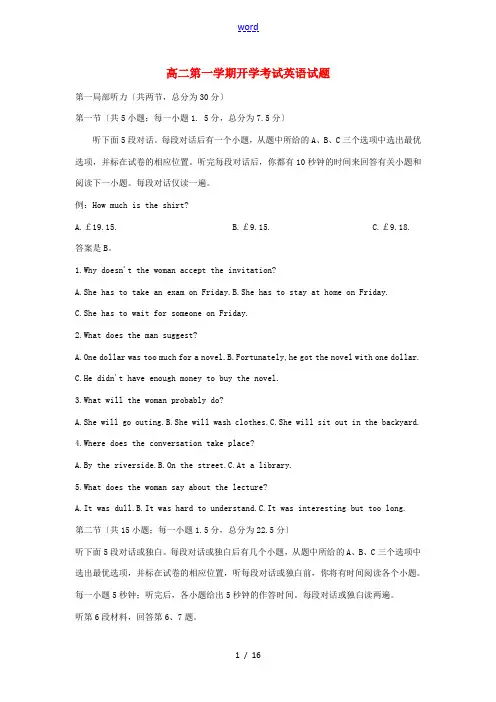
高二第一学期开学考试英语试题第一局部听力〔共两节,总分为30分〕第一节〔共5小题;每一小题1. 5分,总分为7.5分〕听下面5段对话。
每段对话后有一个小题,从题中所给的A、B、C三个选项中选出最优选项,并标在试卷的相应位置。
听完每段对话后,你都有10秒钟的时间来回答有关小题和阅读下一小题。
每段对话仅读一遍。
例:How much is the shirt?A.£19.15.B.£9.15.C.£9.18. 答案是B。
1.Why doesn't the woman accept the invitation?A.She has to take an exam on Friday.B.She has to stay at home on Friday.C.She has to wait for someone on Friday.2.What does the man suggest?A.One dollar was too much for a novel.B.Fortunately,he got the novel with one dollar.C.He didn't have enough money to buy the novel.3.What will the woman probably do?A.She will go outing.B.She will wash clothes.C.She will sit out in the backyard.4.Where does the conversation take place?A.By the riverside.B.On the street.C.At a library.5.What does the woman say about the lecture?A.It was dull.B.It was hard to understand.C.It was interesting but too long.第二节〔共15小题;每一小题1.5分,总分为22.5分〕听下面5段对话或独白。
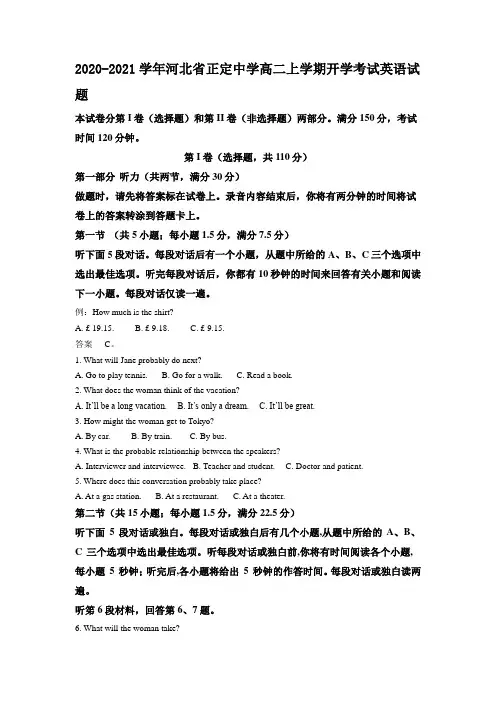
英语测试题I. 单词A(每题1分共30分)1. 特征___________2. 画家____________3. 科学的___________4. 分析___________5. 结论(名词)__________6. 打败__________7. 照顾;出席__________8. 内科医生__________9. 暴露_________ 10. 致命的__________ 11. 挑战__________ 12. 受害者__________ 13. 吸收__________ 14. 怀疑___________ 15. 邻近__________ 16. 严重的________ 17. 责备__________ 18. 处理;操纵_________ 19. 宣布_________ 20. 命令;指示________ 21. 建造(名词)________ 22. 烟火_________ 23. 图标_________ 24. 积极的;肯定的________ 25. 热情的_________ 26. 谨慎的________ 27. 拒绝__________ 28. 联合(V)_________ 29. 省_________ 30. 完成__________II. 单词B(每题1分共30分)31. 冲突_________32. 不愿意的_________ 33. 信任;学分________ 34. 方便(n)_________ 35. 粗糙的;大致的_________36. 吸引___________ 37. 收集__________ 38. 管理___________ 39. 令人愉快的_________ 40. 描述(n)__________41. 可能(n)___________ 42. 争吵_________ 43. 安排_________ 44. 观光_________ 45. 制服_________ 46. 印象__________47. 不断地_________ 48. 先前的_________ 49. 忍受_________ 50. 调整__________ 51. 按压_________ 52. 时刻表________53. 乐观的_________ 54. 公民_________ 55. 按钮__________56. 立刻的_________ 57. 生态________ 58. 吞下__________59. 动机__________ 60. 原料;材料__________III.词组(每题1分共25分)61. 急救______________62. 反复______________63. 在适当位置____________ 64. 有影响______________65. 全神贯注于____________ 66. 因……指控……____________ 67. 在……前面___________ 68. 看不见__________69. 溜进___________ 70. 加速____________71. 拿起;开始____________ 72. 代替_____________73. (机器)损坏__________ 74. 脱离___________75. 省去;遗漏___________ 76. 对……严格_____________77. 把…….分成____________ 78. 讲得通___________79. 由……组成____________80. 提出____________81. 得出结论___________ 82. 将……和……联系___________83. 除……外___________84. 使暴露___________85. 值得赞扬;在……名下_____________IV. 语法填空(每题1.5分共15分)John was presented ____86____ his award at a ceremony___87___ recognized the ___88___(brave) of ten people who had saved the life of another.John was studying in his room___89___ he heard screaming. When he and his father rushed outside, a man ran from ___90___ scene. Theydiscovered that Anne Slade, mother of three, had been stabbed ___91___(repeat) with a knife. She was lying in her front garden ___92___(bleed) very heavily. Her hands had almost been cut off.It was John’s quick action and knowledge of first aid___93___ saved Ms Slade’s life. He immediately asked a number of nearby people for bandages, but when nobody could put their hands on any, his father got some tea towels and tape from their house. John used these____94____(treat) the most severe injuries to Ms Slade’s hands. He ___95___(slow) the bleeding by applying pressure to the wounds until the police and ambulance arrived.V书面表达(本大题50分)Part One(满分35分)阅读下面短文,并按要求用英语写一篇150个词左右的英语短文。
河北省雄安新区博奥高级中学2019-2020学年高二英语上学期开学考试试题(考试时间120分钟,满分150分)APeople all need friends because nobody wants to be lonely and a friend can help you in good and bad times. You’ve made friends since childhood,but you still don’t know who your true friends are. Here are some signs to tell you if your friend is a true friend:Always honestHonesty is important to keep a relationship alive. A true friend always tells you the truth. It may be hard sometimes but lying can destroy a friendship. It is important that your friend speaks honestly and never makes up stories.There are always periods in your life when you have problems or difficulties. A true friend will always have time to listen to your problems and give advice. It may not be able to offer a solution to your problems but the fact that your friend made time to listen is a sign he/she cares for you. Your friend is not a true friend if he/she can never make time for you when you are in trouble. You also need to be reasonable and ac cept that your friend also has other things to do so he/she can’t always listen immediately to your problems.Always respectful (尊敬的)A true friend will always respect your opinion no matter whether he/she agrees or not. Your true friend may disagree but never insists that he/she is correct. Always understandingIt is possible that some problems will arise between you and your friend. A true friend will always be forgiving (体谅的) and understanding,even if it isn’t his/her fault. We are all different people and we all make mistakes. A true friend is always forgiving and understanding because he/she doesn’t want to take the risk of losing his/her best friend.1.What’s the best title for the third paragraph?A.Always there for you. B.Keep your secrets.C.Always happy for you. D.Remember your important days.2.According to the passage,a true friend will always________.A.follow your advice B.offer a solution for your problemsC.listen immediately to your problemsD.respect your opinion even if he/she disagrees with it3.Which of the following is NOT mentioned in the passage?A.Never tell lies to friends. B.Making time for friends.C.Sharing fun with friends. D.Paying attention to a friend’s opinions.4.A true friend will always forgive and understand you because________.A.he/she wants to help you B.he/she doesn’t want to lose youC.he/she wants you to feel confident D.he/she doesn’t care about your mistakes5.What’s the author’s purpose in writing this passage?A.To teach us how to make true friends.B.To find out how long a friendship can last.C.To introduce his experience in making friends.D.To tell us how to find out if a friend is a true friend.BWhen I was about 12, I had an enemy, a girl who liked to point out my shortcomings(缺点). Week by week her list grew: I was very thin, I was not a good student, I talkedtoo much, I was too proud, and so on. I tried to bear all this as long as I could.At last, I became very angry. I ran to my father with tears in my eyes. He listened to me quietly, and then he asked. "Are the things she says trueor not? Janet, didn't you ever wonder what you're really like? Well, you now havethat girl's opinion. Go and make a list of everything she said and mark the pointsthat are true. Pay no attention to the other things she said."I did as he told me. To my great surprise, I discovered that about half thethings were true. Some of them I couldn't change (like being very thin), but a goodnumber I could-and suddenly I wanted to change. For the first time I went to a fairlyclear picture of myself.I brought the list back to Daddy. He refused to take it. "That' s just for you,"he said. "You know better than anyone else the truth about yourself. But you haveto learn to listen, not just close your ears in anger and feeling hurt. When somethingsaid about you is true, you'll find it will be of help to you. Our world is fullof people who think they know your duty. Don't shut your ears. Listen to them all,but hear the truthand do what you know is the right thing to do."Daddy's advice has returned to me at many important moments. In my life, I'venever had a better piece of advice.6. What did the father do after he had heard his daughter's complaint?A. He told her not to pay any attention to what her "enemy" had said and just dowhat she wants to do.B. He criticized (批评) her and told her to overcome her shortcomings.C. He told her to write down all her "enemy" had said and pay attention only to thethings that were true.D. He refused to take the list and want to have a look at it.7. What does "Week by week her list grew" mean?A. She made a list of my shortcomings and kept on adding new ones so it was growinglonger and longer.B. Week by week she discovered more shortcomings of mine and pointed them out tome.C. I was having more and more shortcomings as time went on.D. Week by week, my shortcomings grew more serious.8. Why did her father listen to her quietly?A. Because he believed that what her daughter's "enemy" said was mostly true.B. Because he had been so angry with her daughter and wanted to keepsilent.C. Because he knew that his daughter would not listen to him at that moment.D. Because he was not quite sure which girl was telling the truths.9. Which do you think would be the best title for this passage?A. Not an Enemy, but the Best FriendB. The Best Advice I've Ever HadC. My FatherD. My ChildhoodCLiving a healthy lifestyle lies in forming the right eating habits. Here are someof the good habits you can develop when it comes to healthy eating.Drink plenty of water. You must drink at least 8 glasses of water a day. You mayneed even more water if you are in a hot environment or if you are exercising.Eat breakfast. Breakfast is the most important meal of the day. A recent study hasshown that those who eat breakfast will consume an average of 100 calories less duringthe day than their colleagues who skipped breakfast. They will also be able toconcentrate better.Don’t skip lunch. If you do so, your blood sugar level will drop and your metabolism(新陈代谢) will slow down. When you get home you are starving and eat everythingyou can find.We all need to snack from time to time, but please choose your snacks carefully.In fact, it’s a good idea to eat two healthy snacks besides your three main meals.Choose healthy snacks like fruits and vegetables, low fat yogurt, cottage cheesewith apple sauce, and so on.Eat your fruit and vegetables. We should eat at least 5 servings of fruits andvegetables a day. Take a piece of fruit for a snack, add some banana and raisinsto your favourite breakfast cereal, have a salad with lunch, and eat at least onevegetable at dinner each night.Do not eat your dinner too late. Try to eat dinner at least 3 hours before you goto bed. This will give your body a chance to digest most of the food before you restfor the next 8 hours. Plan dinner for the week ahead of time and make sure you haveeverything you need in the house so other family members can get a head start ondinner if you have a late meeting at the office.10. The underlined word “raisin” most probably means “_____”.A. a dried grapeB. a peach leafC. a piece of cheeseD. a peanut11. Who is this passage intended for?A. Students.B. Office workers.C. Housewives.D. Cooks.12. You may most probably find this article _____.A. in a textbookB. in a science fiction bookC. in a websiteD. in an advertisementDMany blind people use guide dogs to help them get safely from place to place and to warn them of danger. But what can blind people do if they are allergic(过敏的) to dogs or just don't like them? For these people, they can turn to the Guide Horse Foundation.Janet and Don Burleson founded(成立) the organization in 1999. They began training miniature horses to help guide blind people. Miniature horses look just like common horses, only much smaller. They are generally less than 34 inches tall. Cuddles was the foundation's first guide horse in full service. She became 45-year-old Dan Shaw's helper. Shaw has an eye disease and his sight is very poor. One night, while filling out a form to get a guide dog, Shaw heard a news story on TV about people training horses to guide the blind. Shaw loves horses and wanted a guide animal that would live a long time. So he applied(申请),and a year later, Cuddles and Shaw began training as a team.On a trip to New York, Cuddles helped Shaw safely visit many places of interest .They even traveled on a boat and on the subway system.Shaw says that he is very lucky to have Cuddles. He believes that Cuddles has changed his life for the better by giving him the chance to do things himself and making him feel much more confident about himself.13.The Guide Horse Foundation ________.A . was set up by one personB . has different kinds of horsesC . trains horses to guide blind peopleD . has a history of several hundred years14.According to the text, miniature horses ________.A . live a shorter life than guide dogsB . are much smaller than common horsesC . are more friendly to people than dogsD . are different from common horses in many ways15.We know from the text that Dan Shaw ________.A . became blind at age 45B . has a great love for horsesC . heard about guide horses from a friendD . got a guide horse as soon as he applied七选五(共5小题;每小题2分,满分10分)根据短文内容,从短文后的选项中选出能填入空白处的最佳选项。
博奥高中2019-2020学年度上学期开学测试英语试题(考试时间120分钟,满分150分)APeople all need friends because nobody wants to be lonely and a friend can help you in good and bad times. You’ve made friends since childhood,but you still don’t know who you r true friends are. Here are some signs to tell you if your friend is a true friend:Always honestHonesty is important to keep a relationship alive. A true friend always tells you the truth. It may be hard sometimes but lying can destroy a friendship. It is important that your friend speaks honestly and never makes up stories.There are always periods in your life when you have problems or difficulties. A true friend will always have time to listen to your problems and give advice. It may not be able to offer a solution to your problems but the fact that your friend made time to listen is a sign he/she cares for you. Your friend is not a true friend if he/she can never make time for you when you are in trouble. You also need to be reasonable and accept that your friend also has other things to do so he/she can’t always listen immediately to your problems.Always respectful (尊敬的)A true friend will always respect your opinion no matter whether he/she agrees or not. Your true friend may disagree but never insists that he/she is correct.Always understandingIt is possible that some problems will arise between you and your friend. A true friend will always be forgiving (体谅的) and understanding,even if it isn’t his/her fault. We are all different people and we all make mistakes. A true friend is always forgiving and understanding because he/she doesn’t want to take the risk of losing his/her best friend.1.What’s the best title for the third paragraph?A.Always there for you. B.Keep your secrets.C.Always happy for you. D.Remember your important days.2.According to the passage,a true friend will always________.A.follow your advice B.offer a solution for your problemsC.listen immediately to your problemsD.respect your opinion even if he/she disagrees with it3.Which of the following is NOT mentioned in the passage?A.Never tell lies to friends. B.Making time for friends.C.Sharing fun with friends. D.Paying attention to a friend’s opinions.4.A true friend will always forgive and understand you because________.A.he/she wants to help you B.he/she doesn’t want to lose youC.he/she wants you to feel confident D.he/she doesn’t care about your mistakes5.What’s the author’s purpose in writing this passage?A.To teach us how to make true friends.B.To find out how long a friendship can last.C.To introduce his experience in making friends.D.To tell us how to find out if a friend is a true friend.BWhen I was about 12, I had an enemy, a girl who liked to point out my shortcomings(缺点). Weekby week her list grew: I was very thin, I was not a good student, I talked too much, I was tooproud, and so on. I tried to bear all this as long as I could. At last, I became very angry.I ran to my father with tears in my eyes. He listened to me quietly, and then he asked. "Are the things she says true or not? Janet,didn't you ever wonder what you're really like? Well, you now have that girl's opinion. Go andmake a list of everything she said and mark the points that are true. Pay no attention to theother things she said."I did as he told me. To my great surprise, I discovered that about half the things weretrue. Some of them I couldn't change (like being very thin), but a good number I could-and suddenlyI wanted to change. For the first time I went to a fairly clear picture of myself.I brought the list back to Daddy. He refused to take it. "That' s just for you," he said."You know better than anyone else the truth about yourself. But you have to learn to listen,not just close your ears in anger and feeling hurt. When something said about you is true, you'llfind it will be of help to you. Our world is full of people who think they know your duty. Don'tshut your ears. Listen to them all, but hear the truthand do what you know is the right thing to do."Daddy's advice has returned to me at many important moments. In my life, I've never hada better piece of advice.6. What did the father do after he had heard his daughter's complaint?A. He told her not to pay any attention to what her "enemy" had said and just do what she wantsto do.B. He criticized (批评) her and told her to overcome her shortcomings.C. He told her to write down all her "enemy" had said and pay attention only to the things thatwere true.D. He refused to take the list and want to have a look at it.7. What does "Week by week her list grew" mean?A. She made a list of my shortcomings and kept on adding new ones so it was growing longer andlonger.B. Week by week she discovered more shortcomings of mine and pointed them out tome.C. I was having more and more shortcomings as time went on.D. Week by week, my shortcomings grew more serious.8. Why did her father listen to her quietly?A. Because he believed that what her daughter's "enemy" said was mostly true.B. Because he had been so angry with her daughter and wanted to keepsilent.C. Because he knew that his daughter would not listen to him at that moment.D. Because he was not quite sure which girl was telling the truths.9. Which do you think would be the best title for this passage?A. Not an Enemy, but the Best FriendB. The Best Advice I've Ever HadC. My FatherD. My ChildhoodCLiving a healthy lifestyle lies in forming the right eating habits. Here are some of the goodhabits you can develop when it comes to healthy eating.Drink plenty of water. You must drink at least 8 glasses of water a day. You may need even morewater if you are in a hot environment or if you are exercising.Eat breakfast. Breakfast is the most important meal of the day. A recent study has shown thatthose who eat breakfast will consume an average of 100 calories less during the day than their colleagues who skipped breakfast. They will also be able to concentrate better.Don’t skip lunch. If you do so, your blood sugar l evel will drop and your metabolism (新陈代谢) will slow down. When you get home you are starving and eat everything you can find.We all need to snack from time to time, but please choose your snacks carefully. In fact, it’sa good idea to eat two healthy snacks besides your three main meals. Choose healthy snacks likefruits and vegetables, low fat yogurt, cottage cheese with apple sauce, and so on.Eat your fruit and vegetables. We should eat at least 5 servings of fruits and vegetables a day.Take a piece of fruit for a snack, add some banana and raisins to your favourite breakfast cereal,have a salad with lunch, and eat at least one vegetable at dinner each night.Do not eat your dinner too late. Try to eat dinner at least 3 hours before you go to bed. This will give your body a chance to digest most of the food before you rest for the next 8 hours. Plan dinner for the week ahead of time and make sure you have everything you need in the house so other family members can get a head start on dinner if you have a late meeting at the office.10. The underlined word “raisin” most probably means “_____”.A. a dried grapeB. a peach leafC. a piece of cheeseD. a peanut11. Who is this passage intended for?A. Students.B. Office workers.C. Housewives.D. Cooks.12. You may most probably find this article _____.A. in a textbookB. in a science fiction bookC. in a websiteD. in an advertisementDMany blind people use guide dogs to help them get safely from place to place and to warn them of danger. But what can blind people do if they are allergic(过敏的) to dogs or just don't like them? For these people, they can turn to the Guide Horse Foundation.Janet and Don Burleson founded(成立) the organization in 1999. They began training miniature horses to help guide blind people. Miniature horses look just like common horses, only much smaller. They are generally less than 34 inches tall.Cuddles was the foundation's first guide horse in full service. She became 45-year-old Dan Shaw's helper. Shaw has an eye disease and his sight is very poor. One night, while filling out a form to get a guide dog, Shaw heard a news story on TV about people training horses to guide the blind. Shaw loves horses and wanted a guide animal that would live a long time. So he applied(申请),and a year later, Cuddles and Shaw began training as a team.On a trip to New York, Cuddles helped Shaw safely visit many places of interest .They even traveled on a boat and on the subway system.Shaw says that he is very lucky to have Cuddles. He believes that Cuddles has changed his life for the better by giving him the chance to do things himself and making him feel much more confident about himself.13.The Guide Horse Foundation ________.A . was set up by one personB . has different kinds of horsesC . trains horses to guide blind peopleD . has a history of several hundred years14.According to the text, miniature horses ________.A . live a shorter life than guide dogsB . are much smaller than common horsesC . are more friendly to people than dogsD . are different from common horses in many ways15.We know from the text that Dan Shaw ________.A . became blind at age 45B . has a great love for horsesC . heard about guide horses from a friendD . got a guide horse as soon as he applied七选五(共5小题;每小题2分,满分10分)根据短文内容,从短文后的选项中选出能填入空白处的最佳选项。
高二年级第一学期第1次月考英语试卷第一部分听力(共两节,满分30分)做题时,先将答案标在试卷上。
录音内容结束后,你将有两分钟的时间将试卷上的答案转涂到答题卡上。
第一节(共5小题:每题1.5分)听下面5段对话,每段对话后有一小题,从题中所给的A,B,C三个选项中选出最佳选项,并标在试卷的相应位置,听完每段对话后,你都有15秒钟的时间来回答有关小题和阅读下一小题。
每段对话只读一遍。
1. How is the weather in the woman’s opinion?A. Warm.B. Cold.C. Hot.2. What does the man mean?A. He already has plans.B. The woman should decide.C. He will make a reservation.3. Why did the man go to Beijing?A. To visit his parents.B. To have an interview.C. To receive job training.4. What are the two speakers talking about?A. What to take up as a hobby.B. How to keep fit.C. How to handle pressure.5. What will the man do first?A. Tidy his room.B. Go on a picnic.C. Wear clothes.第二节(共15小题:每小题1.5分)听下面5段对话或独白,每段对话或独白后有几个小题,从题中所给的A、B、C三个选项选出最佳选项,并标在试卷相应位置,听每段对话或独白前,你将有时间阅读各个小题,每小题5秒钟,听完后,各小题给出5秒钟的作答时间,每段对话或独白读两遍。
听下面一段对话,回答第6和第7两个小题。
河北省武邑中学2020学年高二英语上学期开学考试试题(无答案)本试卷分第Ⅰ卷(选择题)和第Ⅱ卷(非选择题)两部分,共8页。
考试结束后,只交答题卡。
保存好试卷。
第Ⅰ卷第一节完形填空(共20小题;每小题2分,满分40分)阅读下面短文,从短文后各题所给的四个选项(A、B、C和D)中,选出可以填入空白处的最佳选项,并在答题卡上将该项涂黑。
Dario and his mother loved their new apartment. The living room was large enough for their piano. That night, the two of them 1 side by side at the piano. They played jazz music to celebrate their new home. The loud 2 filled the room and made them feel very happy.The next morning, 3 , their happiness disappeared. Someone had left a 4 under their door during the night. One of their neighbors had written to complain about the sound of the piano. Dario’s mother asked the building superintendent if he knew anything about it. But he said that they were all 5 people and he couldn’t imagine any of them had done that. Later that morning, Dario suggested that they write a letter to their 6 and apologize for their playing.“Maybe we could go and 7 everyone in person.” his mother said. “What if we invited them to come her e for a 8 instead? Dario asked.They both loved the 9 . Over the next few days, they sent out invitations and prepared desserts 10 their guests. They decorated the apartment with streamers and party lights.Finally, the day of the party 11 . Some guests brought presents.Others brought flowers. Some even brought desserts to 12 . One woman, Mrs. Gilbert, 13 Dario’s mother with a book of piano music by Chopin.“I heard you playing the other night,” she said. “The sounds woke me out of bed. I 14 that you might play like this every night. So I wrote a short note. I hope you don’t think I disliked the playing.”Dario’s mother smiled at Mrs. Gilbert. “I think maybe we 15 you an apology.” she said. “I didn’t 16 how late it was when we were playing. Maybe we should play some quieter music at night.“You play, you play!” Mrs. Gilbert said. “I like what you play! Just not so loud at night.” She pointed to the book she had given them. “These songs are not such 17 music.”“These songs are beautiful music.” Dario’s mother said. “We will be 18 to play them in the evening.”“And we won’t play so loud or late!” Dario said. He was already looking forward to 19 the new music. More than that, however, he was happy to see the big smile o n his mother’s face. It gave him a feeling of 20 and made him feel that they were home at last.1. A. stood B. sat C. lay D. walked2. A. voice B. ring C. music D. cry3. A. therefore B. instead C. otherwise D. however4. A. bill B. poster C. note D. report5. A. proud B. rich C. lucky D. nice6. A. relatives B. friends C. neighbors D. audience7. A. blame B. instruct C. question D. visit8. A. show B. concert C. party D. play9. A. experience B. idea C. performance D. action10. A. for B. with C. to D. from11. A. continued B. arrived C. passed D. finished12. A. order B. share C. sell D. advertise13. A. presented B. treated C. helped D. served14. A. promised B. admitted C. agreed D. worried15. A. give B. owe C. offer D. send16. A. remember B. realize C. understand D. accept17. A. sweet B. strange C. loud D. funny18. A. brave B. happy C. sorry D. afraid19. A. changing B. practicing C. recording D. writing20. A. warmth B. freedom C. equality D. sympathy第二部分阅读理解(共两节,满分60分)第一节(共15小题;每小题3分,满分45分)阅读下列短文,从每题所给的四个选项(A、B、C、D)中,选出最佳选项,并在答题卡上将该项涂黑。
2019高二开学检测英语试题第二部分:阅读理解(共两节,满分40分)第一节(共15小题;每小题2分,满分30分)阅读下列短文,从每题所给的A、B、C和D四个选项中,选出最佳选项。
AIn 1977, a dead author of detective stories saved the life of a 19-month-old baby in a most unusual way. The author was Agatha Christie, one of the most successful writers of detective stories in the world.In June 1977, a baby girl became seriously ill in Qatar, near Saudi Arabia. Doctors were unable to find out the cause of her illness with confidence, so she was sent to Hammersmith Hospital in London. She was then only semi-conscious and on the "Dangerously Ill" list. A team of doctors hurried to examine the baby only to discover that they, too, were confused by the very unusual symptoms (症状). While they were discussing the baby's case, a nurse asked to speak to them."Excuse me," said Nurse Marsha Maitlan, "but I think the baby is suffering from thallium (铊) poisoning(中毒).""What makes you think that?" Dr. Brown asked. "Thallium poisoning is extremely rare.""A few days ago, I was reading a novel called A Pale Horse by Agatha Christie," Nurse Maitlan explained. "In the book, somebody uses thallium poison, and all the symptoms are described. They're exactly the same as the baby's.""You're very thoughtful and you may be right," another doctor said. "We'll carry out some tests and find out whether it's thallium or not."Tests showed that the baby had indeed been poisoned by thallium, a rare metallic substance(物质) used in making special glass. Once they knew the cause of the illness, the doctors were able to give the baby the correct treatment. She soon recovered and was sent back to Qatar. Later it was reported that the poison might have come from an insecticide (杀虫剂) used in Qatar.1. The baby was sent to London because _____.A. she was born thereB. the hospitals in Qatar were full at that timeC. she was the daughter of a doctor in LondonD. the Qatar doctors were not sure whether they could cure her2. As far as we can tell from the passage, Agatha Christie _____.A. had never met this babyB. had spent a long time studying the baby's caseC. visited the baby in the hospital at HammersmithD. gave Nurse Maitlan some advice on the phone3. It seems likely from the passage that the baby's illness had something to do with _____.A. a dangerous pair of glassesB. the water in QatarC. a harmful substance used to kill insectsD. a dead writer【答案】1. D 2. A 3. C【解析】文章讲述了一个19岁的女孩由于中了铊毒,没人医生能够从病症中知道是什么原因,后来一个护士说她读过一本侦探小说,作者描述的中毒症状和这个女孩子的一模一样,通过已故侦探小说作者对铊毒的描述,使医生知道了病因,女孩很快得救了。
高二英语上学期开学考试试题考生注意:1.本试卷共150分,考试时间120分钟。
2.请将各题答案填写在答题卡上。
第一部分听力(共两节,满分30分)做题时,先将答案标在试卷上。
录音内容结束后,你将有两分钟的时间将试卷上的答案转涂到答题卡上。
第一节(共5小题;每小题1. 5分,满分7. 5分)听下面5段对话。
每段对话后有一个小题,从题中所给的A、B、C三个选项中选出最佳选项。
听完每段对话后,你都有10秒钟的时间来回答有关小题和阅读下一小题。
每段对话仅读一遍。
例:How much is the shirt?A.£ 19. 15.B. £ 9. 18.C. £ 9. 15.答案是C o1. What time is it now?A.5:00.B. 6:30.C. 7:30.2. What will the woman do tomorrow?A. Meet herB. Finish her homework.C. Take an English exam.3. What did the man do on New Year's Day?A. He was away on holiday.B. He stayed at home all day.C. He worked in the company.4. Which author does Mary love best?A. Dickens.B. Hemingway.C. Shakespeare.5. How long will the trip take?A. A week.B. Six days.C. Ten days.第二节(共15小题;每小题1. 5分,满分22. 5分)听下面5段对话或独白。
每段对话或独白后有几个小题,从题中所给的A、B、C三个选项中选出最佳选项。
听每段对话或独白前,你将有时间阅读各个小题,每小题5秒钟;听完后,各小题将给出5秒钟的作答时间。
每段对话或独白读两遍。
听第6段材料,回答第6、7题。
6. Which class is Michael in?A. Class Two.B. Class Three.C. Class Four.7. What will there be on next Saturday afternoon?A. A football match.B. A basketball game.C. A swimming lesson. 听第7段材料,回答第8、9题。
8. Where does the conversation probably take place?A. In a zoo.B. On a farm.C. In a bookstore.9. How much does Zoo Animals cost?A. $ 10.B. $ 12.C. $ 20.听第8段材料,回答第10至12题。
10. What is the probable relationship between the speakers?A. Doctor and patient.B. Boss and customer.C. Teacher and student.11. What does the man advise the woman to do?A. Take much exercise.B. Take some medicine.C. Drink more cold water.12. What does the woman drink every night?A. Tea.B. Milk.C. Coffee.听第9段材料,回答第13至16题。
13. What have Mary's family and friends been worried about?A. Her job.B. Her study.C. Her health.14. What did Mary's father want her to work as?A. A secretary.B. A waiter.C. An assistant.15. Whose company is in need of designers?A. Mary's father's.B. Mary's friend's.C. Mary's aunt's.16. What will Mary probably do next?A. Leave home.B. Think it over before deciding.C. Call her family and friends back.听第10段材料,回答第17至20题。
17. What did Lincoln's father do?A. A teacher.B. A worker.C. A farmer.18. Why was Lincoln sad most of the time?A. His life was too boring.B. His family was too poor.C. There was no school to attend there.19. Why did Mrs Lincoln go to the town?A. To meet someone.B. To buy Lincoln a gift.C. To attend a birthday party.20. What do we know about Lincoln?A. He loved reading books.B. He liked to go shopping with his mother.C. He found it interesting to work on the farm.第二部分阅读(共两节,满分50分)第一节(共15小题;每小题2. 5分,满分37. 5分)阅读下列短文,从每题所给的A、B、C、D四个选项中选出最佳选项。
AWorld Earth Day is on April 22. It's a day when people around the world work to help the planet, including kids. Here are what four kids have done for the planet.Speaking OutJaysa Hunter-Mellers , 14, spoke at the City Hall to ask leaders to shut the last coal power station nearby which brought her an asthma (哮喘)attack. She didn't think that people would listen to her, a kid. But the coal power station later said it would close. Jaysa learned to speak to her local government at a young age and now she wants to teach others to speak up too.Helping ButterfliesWhen Alden Wang was 6, he learned that local butterflies were in trouble because they needed a kind of grass, milkweed, to survive. But milkweed was disappearing. So Alden star-ted growing milkweed in his house, on which the butterflies lay eggs. Alden is now 13 and he cares for eggs and lets them go when they turn into butterflies.Doing Good for Gorillas (大猩猩)When Addy Barrett was in the first grade, she learnt that the mountain gorillas were in danger. She wanted to protect them and set up a program called Gorilla Heroes. So far, Gorilla Heroes has raised more than $ 11 , 000 to help mountain gorillas. Addy says, “The feeling of having a fine effect on the world is like no other. It feels so good to know that I am making a difference. ”Educating the YouthIn the fourth grade, Jeremy Clark and Charlie Abrams saw a picture of the Statue of Liberty (自由女神像)up to her waist in water. It was meant to show what the statue would look like if all the ice in the world is turned into water. In 2019, they started a team called Affected Generation to urge young people to become climate activists. The two alsowant schools to teach about climate change.21. Why did Jaysa call on the government to close the coal power station?A. It made too much noise.B. It caused health problems to her.C. She wanted to set an example for others.D. She wanted to warn government leaders.22. How does Alden Wang help butterflies?A. By collecting their eggs.B. By feeding them on milk.C. By turning eggs into butterflies.D. By planting grass they lay eggs on.23. Who set up a team to protect the environment?A. Aiden Wang.B. Addy Barrett.C. Jaysa Hunter-Mellers.D. Jeremy Clark and Charlie Abrams.B“What's your 'Thing of the Day'?" I asked my fourteen-year-old son as he got a piece of potato onto his plate. This is a question our four kids and whichever friends are staying for supper expect to be asked each evening at suppertime. Usually, it's followed with, “Uhh.… Umm.. . We had pizza for lunch. ” And then I have to refuse the response and ask for something meaningful—either something he learned or something that happened with his friends.But, this day, my son surprised me as he went into great detail about how he had been honestly wronged by a couple of classmates and laughed at in front of the class. I asked more questions and learned that the teachers were aware of the situation. The issue had been dealt with as much as the teachers and staff were able to. It was really just a matter of kids being mean and deciding to play a trick on someone.I thought about the situation all night. I vacillated between meeting the teachers? meeting the parents of the classmates, and not doing anything since the story had been told to me in a matter-of-fact way—not overly excitedly.I waited until the next day after school. On the car ride home, I questioned my son what about today after yesterday's situation. My son was surprised that I brought it up again. “What? No, it's over, Mom. They're my friends. They were just being stupid. They apologized. Forgive and forget, you know? We're all good.I was worried that perhaps he was trying to hide his concern or sadness about the thing. But as I watched him over the next days and weeks, everything seemed “normal". Wouldn't it be great if everyone could live the “forgive a nd forget" way of life?24. How are children's usual answers to the author's daily question?A. Serious.B. Worrisome.C. Meaningless.D. Detailed.25. Why was the author sleepless that night?A. Her son was made fun of unkindly.B. Her son invited his friends to dinner.C. Her son was punished by his teacher.D. Her son lied to her about his mistake.26. What does the underlined word “vacillate" in paragraph 3 probably mean?A. Give suggestions.B. Make sense.C. Persuade oneself.D. Be undecided.27. What did the author learn from the whole story?A. It is good to forgive and forget.B. It is necessary to watch her son.C. It is difficult to understand children.D. It is surprising for her son to apologize.CChurchill, Manitoba is a small town. The northern winds roll through it from Canada's Hudson Bay (海湾).It might be just another point on the map if not for its seasonal settlers.It happens like clockwork every fall that hundreds of polar bears make their way through the town to the freezing bay where they hunt for seals(海豹) after the ice packs enough to support their weight. The animals have been connected with Churchill since at least 1619. That's when Norwegian explorer Jens Munk and his sailors recorded making a meal of one bear while they w intered in the area. “It was of good taste and did not disagree with us. " That's what Munk wrote in his journal.Over the years, the animals' coming has earned the town the name of “Polar Bear Capital of the World. Today, Churchill's bear population goes beyond its human population. There used to be about 7,000 residents but now only 813 living there. There was no such thing as an organized tour group to see the bears until 1980. The town might have been in terrible financial hardships. But the growing bear tourism industry helped.Today, some 10,000 tourists come to the town to see polar bears for six weeks in autumn every year. But the reasons why they come are different from before. Everyone was happier and they had such a good time seeing polar bears. Now things have changed because the word is out that this Western Hudson Bay population of bears, Churchill Bears, are going to be the first population of polar bears to die out. So when the tourists come up, they all have a little bit of a lump in their throats (如鲠在喉)because they're looking at a beautiful bear, but they're also looking at a dying-out bear, which makes the whole attitude toward the bears different. Unfortunately,that's becoming the major part of the whole attraction of the tours as well. Come and see the bears before it's too late.28. What can we learn about Churchill polar bears from the text?A. They have eaten up the seals in the Hudson Bay.B. They come to Churchill at the same time every year.C. They move to Churchill to escape the northern winds.D. They are so dangerous that most natives left their home.29.What did Munk report in his journal?A. They fed many polar bears.B. Polar bears were dangerous.C. They hunted a bear for food.D. They found some seals in the bay.30. How do polar bears benefit Churchill?A. They make many people settle down.B. They attract many hunters to come here.C. They bring much tourist income.D. They supply food to locals.31. What is the main reason why tourists go to Churchill now?A. To say good-bye to Churchill Bears.B. To help polar bears become happier.C. To take photos with Churchill Bears.D. To stop polar bears going to the town.DEarlier research had suggested we're best at learning grammar in early childhood. Then we hit a dead end around age 5. It's supposed to be much harder for older kids. The time when people can learn the rules and structure of a language well appears to last until around age 17 or 18. “But that's not so," says psychologist (心理学家)Joshua Hartshorne.Hartshorne asked friends to take an online English grammar test. After completing the test, volunteers answered questions about where they had lived, the languages they had spo-ken from birth and the age at which they first started learning English. Hartshorne also asked how long they had lived in an English-speaking country. As he had hoped, people shared the test widely online. This let Hartshorne's group study the answers from 669,498 native and non-native speakers of English. The researchers used statistics to find out when people with different English-speaking experiences reached their top grammar ability.If people moved to a new country and began speaking English by age 10 to 12,they final-ly spoke it as well as folks who had learned both English and another language from birth. But both groups scored a little worse than people who spoke English only, the researchers found. The test results showed that around age 17, people's ability to learn grammar took a sharp drop. And those who started learning English after age 10 or 12 never reached the same level of English skillfulness as people who started younger. Why? The researchers think it's because they had fewer years to practice before their skills dropped off at 17. Buthere's the surprise: Language learning did not end at 17. People's English skills kept improving a little until around age 30 , the new study found. And this was true among both native speakers and those who learned English as a second language. Still, most language learning happened by age 20, the new study decided.32. What age period is best for grammar learning according to earlier research?A. From 17 to 20.B. From 5 to 12.C. Before age 5.D. From 20 to 30.33. How did Hartshorne get his study statistics?A. By experimenting in the lab.B. By making an online survey.C. By studying historical records.D. By collecting earlier study results.34. Which of the following agrees with Hartshorne's study results?A. Language learning needs much practice.B. Language learning ends at the age of 17.C. The more languages you learn, the better.D. It is best to learn language after 20 years old.35. What is the best title for the text?A. How native speakers learn English?B. What's the best age to learn a language?C. What's the best way to learn a foreign language?D. Why non-native speakers can never master a second language?第二节(共5小题;每小题2. 5分,满分12. 5分)阅读下面短文,从短文后的选项中选出可以填入空白处的最佳选项。